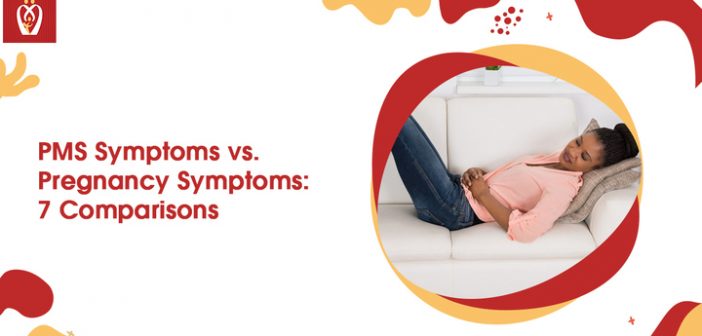Several of the symptoms of premenstrual syndrome are similar to those of the first trimester of pregnancy. Because of this, some women find it difficult to tell whether they’re pregnant or if their period is about to begin.
Tender breasts, cramps, and mood swings are common symptoms of premenstrual syndrome (PMS) and pregnancy. However, each woman may experience these conditions differently.
Breast Pain
If you suffer from premenstrual syndrome (PMS), breast swelling and discomfort might develop in the second part of your menstrual cycle. A woman’s menstruation is preceded by a time of intense tenderness, which may vary from moderate to severe. Symptoms are more powerful in women of reproductive age.
Some women report that their breast tissue feels rough and thick, particularly in the outer portions. Breast discomfort and a deep, heavy ache may accompany the sensation of breast fullness. As your progesterone levels drop, the pain normally subsides during or after your period.
During the first trimester of pregnancy, your breasts may be painful or uncomfortable to the touch. They may also feel bloated and heavy. As your progesterone levels grow throughout your pregnancy, you’ll notice a heightened sensitivity and swelling in your breasts between one and two weeks after conception.
Alterations in mood
In early pregnancy and the days leading up to a period, irritability, anxiety, and sadness are frequent.
After menstruation, the symptoms of premenstrual syndrome (PMS) tend to fade. Pregnancy may be suspected if the person’s mood changes and they miss their period.
The despondency that lasts for a long time is an indication of depression. If you’ve been experiencing low emotions for more than two weeks, it’s time to see your GP.
Depression is the most frequent mental health issue that affects pregnant women across the globe.
Bleeding
In most cases, bleeding or spotting are not signs of PMS. In the midst of menstruation, the flow might linger for up to a week.
Light vaginal bleeding or spotting in pink or dark brown is a common pregnancy symptom for some women. This normally occurs 10 to 14 days after conception and isn’t enough to fill a tampon or pad. Rather than a regular period, the spotting normally lasts for a few days.
Fatigue
Progesterone, a hormone, contributes to premenstrual exhaustion. However, after the onset of the period, tiredness is usually gone.
For women with heavy periods, exhaustion might linger for the whole duration of the ovulation cycle. Iron deficiency anemia may also be a factor.
Fatigue is another frequent symptom of pregnancy in the first trimester. Pregnancy exhaustion is common in the first trimester, and some women have it for nine months. Pregnancy weariness may be exacerbated by a lack of sleep and frequent midnight urination.
Nausea
Even if your period is late, you shouldn’t anticipate having nausea or vomiting as a result of the symptoms of PMS.
One of the most traditional and obvious indications of pregnancy is morning sickness. Many women have bouts of nausea within the first month of being pregnant. Depending on the severity of nausea, vomiting may or may not be present. Although it’s called “morning sickness,” it may strike at any hour of the day or night, depending on the person. In contrast to this, not all women are afflicted by morning sickness.
Cramping | pregnancy symptoms
If you have PMS, you may suffer from cramps known as dysmenorrhea before your period. During your period, the discomfort will likely lessen and finally disappear.
Your menstrual cramps are likely to lessen after your first pregnancy or as you become older. However, as a woman nears menopause, she may notice an increase in cramps.
In the first trimester of pregnancy, minor or light cramping may occur. Your lower abdomen or lower back will be cramped up as you experience after your period, although these cramps won’t be as severe.
You must understand what’s causing your problems. You’ll be able to obtain the best treatment if you discover you’re pregnant as soon as possible. Pregnancy tests are the best method to detect whether your symptoms are due to PMS or if you’re pregnant.
Keeping a note of your symptoms might also help you realize when your usual routine is disrupted. See your GP if you have any concerns or questions regarding your symptoms.







